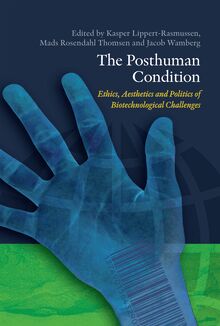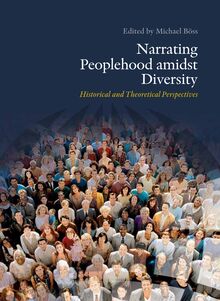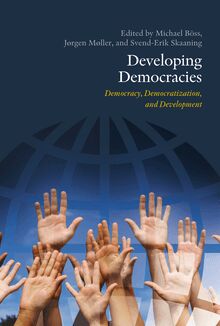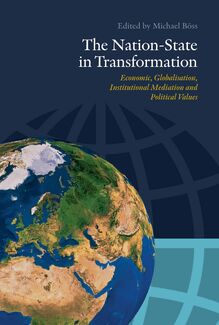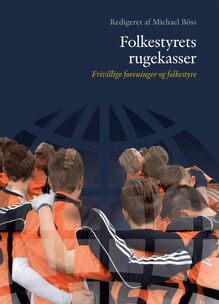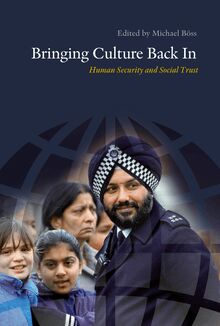-
 Univers
Univers
-
 Ebooks
Ebooks
-
 Livres audio
Livres audio
-
 Presse
Presse
-
 Podcasts
Podcasts
-
 BD
BD
-
 Documents
Documents
-
- Cours
- Révisions
- Ressources pédagogiques
- Sciences de l’éducation
- Manuels scolaires
- Langues
- Travaux de classe
- Annales de BEP
- Etudes supérieures
- Maternelle et primaire
- Fiches de lecture
- Orientation scolaire
- Méthodologie
- Corrigés de devoir
- Annales d’examens et concours
- Annales du bac
- Annales du brevet
- Rapports de stage
La lecture à portée de main
402 pages
English
Découvre YouScribe en t'inscrivant gratuitement
Je m'inscrisDécouvre YouScribe en t'inscrivant gratuitement
Je m'inscris
Obtenez un accès à la bibliothèque pour le consulter en ligne
En savoir plus
En savoir plus
402 pages
English
Obtenez un accès à la bibliothèque pour le consulter en ligne
En savoir plus
En savoir plus

Description
The Nation-State in Tranformation discusses the significance of the state in a globalised economy. Focusing on Denmark and Ireland, the book analyses how small states adapt to the international market and argues that the institutional mediation of globalisation helps us explain why some states seem to possess more capacity to adjust than others. Not only must we bring the state back in,' we must also consider how history, culture and collective identities influence the performance of the nation-state in the new globalised world order. With contributions by Francis Fukuyama, Bob Jessop, David Marsh, John A Hall and John Campbell, Georg Sorensen, Bjorn Hvinden, Rory ODonnell, Peadar Kirby, Joseph Ruane, Brian Girvin, Sean ORiain, Chris McInerny, Gert and Gunnar Svendsen, Lars Bo Kaspersen and Linda Thorsager, Henrik Bang, and Michael Boss.
Sujets
Informations
| Publié par | Aarhus University Press |
| Date de parution | 16 juillet 2010 |
| Nombre de lectures | 0 |
| EAN13 | 9788779342071 |
| Langue | English |
| Poids de l'ouvrage | 4 Mo |
Informations légales : prix de location à la page 0,1950€. Cette information est donnée uniquement à titre indicatif conformément à la législation en vigueur.
Extrait
Edited byMichael Böss The NationState in Transformation Economic Globalisation, Institutional Mediation and Political Values
The NationState in Transformation
The NationState in Transformation Economic Globalisation, Institutional Mediation and Political Values
Edited by Michael Böss
A A R H U S U N I V E R S I T Y P R E S S
The NationState in Transformation MatchPoints 1 © the authors and Aarhus University Press Typeset by Narayana Press Cover design by Jørgen Sparre
ISBN 978 87 7934 207 1 ISSN 19043384
Published with the financial support of The Aarhus University Research Foundation
Aarhus University Press
Århus Langelandsgade 177 DK – 8200 Århus N
København Tuborgvej 164 DK – 2400 København NV
www.unipress.dk
INTERNATIONAL DISTRIBUTORS: Gazelle Book Services Ltd. White Cross Mills Hightown, Lancaster, LA1 4XS United Kingdom www.gazellebookservices.co.uk
The David Brown Book Company Box 511 Oakville, CT 06779 USA www.oxbowbooks.com
Contents
Preface . . . . . . . . . . . . . . . . . . . . . . . . . . . . . . . . . . . . . . . . . . . . . . . . . . . . . . . . . . . . . . . . . . . . . . . . . . . . . . . . . . . . . . . .
Notes on contributors . . . . . . . . . . . . . . . . . . . . . . . . . . . . . . . . . . . . . . . . . . . . . . . . . . . . . . . . . . . . . . . . . . . . . . . . . . .
List of Tables and Figures . . . . . . . . . . . . . . . . . . . . . . . . . . . . . . . . . . . . . . . . . . . . . . . . . . . . . . . . . . . . . . . . . . . . . . . .
1. Towards a New Consensus Michael Böss . . . . . . . . . . . . . . . . . . . . . . . . . . . . . . . . . . . . . . . . . . . . . . . . . . . . . . . . . . . . . . . . . . . . . . . . . . . . . . . . . . .
PART I HISTORIES AND INSTITUTIONS
2. The Political Economy of Scale and Nation, with Special Reference to Denmark John L. Campbelland John A. Hall . . . . . . . . . . . . . . . . . . . . . . . . . . . . . . . . . . . . . . . . . . . . . . . . . . . . . . . . . . . . . . . .
3. The Historical Dimension of Ireland’s Road to Modernisation and Europeanisation Brian Girvin . . . . . . . . . . . . . . . . . . . . . . . . . . . . . . . . . . . . . . . . . . . . . . . . . . . . . . . . . . . . . . . . . . . . . . . . . . . . . . . . . . . .
PART II POLITICAL AND ECONOMIC IMAGINARIES
4. It’s Not the Economy, Stupid – Or is It? David Marsh . . . . . . . . . . . . . . . . . . . . . . . . . . . . . . . . . . . . . . . . . . . . . . . . . . . . . . . . . . . . . . . . . . . . . . . . . . . . . . . . . . .
7
9
15
17
37
60
87
5. The Knowledge Economy as a State Project Bob Jessop . . . . . . . . . . . . . . . . . . . . . . . . . . . . . . . . . . . . . . . . . . . . . . . . . . . . . . . . . . . . . . . . . . . . . . . . . . . . . . . . . . . . .110
6. Globalisation, the NationState and the Public Sector Francis Fukuyama. . . . . . . . . . . . . . . . . . . . . . . . . . . . . . . . . . . . . . . . . . . . . . . . . . . . . . . . . . . . . . . . . . . . . . . . . . . . . . .130
PART III STATE, MARKET AND GOVERNANCE
7. Negotiated Governance and Hybridity in Small European Countries: Ireland and Denmark Rory O’Donnell . . . . . . . . . . . . . . . . . . . . . . . . . . . . . . . . . . . . . . . . . . . . . . . . . . . . . . . . . . . . . . . . . . . . . . . . . . . . . . . . .149
8. Addicted to Growth: State, Market and the Difficult Politics of Development in Ireland Seán Ó Riain . . . . . . . . . . . . . . . . . . . . . . . . . . . . . . . . . . . . . . . . . . . . . . . . . . . . . . . . . . . . . . . . . . . . . . . . . . . . . . . . . . .163
9. The Competition State: Irish Lessons Peadar Kirby . . . . . . . . . . . . . . . . . . . . . . . . . . . . . . . . . . . . . . . . . . . . . . . . . . . . . . . . . . . . . . . . . . . . . . . . . . . . . . . . . . .191
10. Ireland’s Multiple InterfacePeriphery Development Model: Achievements and Limits Joseph Ruane. . . . . . . . . . . . . . . . . . . . . . . . . . . . . . . . . . . . . . . . . . . . . . . . . . . . . . . . . . . . . . . . . . . . . . . . . . . . . . . . . . .213
11. Globalisation and Development: Ireland and Denmark in Comparative Perspective Georg Sørensen. . . . . . . . . . . . . . . . . . . . . . . . . . . . . . . . . . . . . . . . . . . . . . . . . . . . . . . . . . . . . . . . . . . . . . . . . . . . . . . . .233
PART IV DEMOCRATIC VALUES, SOCIAL COHESION AND BELONGING
12. Responding to Globalisation: Changing the State Strategy from Infrastructural Power to Authoritarian Liberal Power Lars Bo Kaspersen og Linda Thorsager . . . . . . . . . . . . . . . . . . . . . . . . . . . . . . . . . . . . . . . . . . . . . . . . . . . . . . . . . . . .247
13. Pragmatic Nationals: The Character and Roots of Danish Europragmatism Michael Böss . . . . . . . . . . . . . . . . . . . . . . . . . . . . . . . . . . . . . . . . . . . . . . . . . . . . . . . . . . . . . . . . . . . . . . . . . . . . . . . . . . .268
14. The Nordic Welfare Model and the Challenge of Globalisation Bjørn Hvinden. . . . . . . . . . . . . . . . . . . . . . . . . . . . . . . . . . . . . . . . . . . . . . . . . . . . . . . . . . . . . . . . . . . . . . . . . . . . . . . . . .292
15. Social Capital and the Welfare State Gert Tinggaard Svendsen Gunnar Lind Haase Svendsen . . . . . . . . . . . . . . . . . . . . . . . . . . . . . . . . . . . . . . . . . . . . . . . . . . . . . . . . . . . . . . . . . . . .315
16. Between Democracy and Good Governance: A NationalGlobal Quest Henrik P. Bang . . . . . . . . . . . . . . . . . . . . . . . . . . . . . . . . . . . . . . . . . . . . . . . . . . . . . . . . . . . . . . . . . . . . . . . . . . . . . . . . .340
17. Social Partnership in Ireland: Diluting or Deepening Democracy? Chris McInerney . . . . . . . . . . . . . . . . . . . . . . . . . . . . . . . . . . . . . . . . . . . . . . . . . . . . . . . . . . . . . . . . . . . . . . . . . . . . . . . .362
18. General Conclusions and Perspectives Michael Böss . . . . . . . . . . . . . . . . . . . . . . . . . . . . . . . . . . . . . . . . . . . . . . . . . . . . . . . . . . . . . . . . . . . . . . . . . . . . . . . . . . .384
Index . . . . . . . . . . . . . . . . . . . . . . . . . . . . . . . . . . . . . . . . . . . . . . . . . . . . . . . . . . . . . . . . . . . . . . . . . . . . . . . . . . . . . . . . . .391
Preface
This book is about the significance of the nationstate in an internationalised economy. Although each contribution has its own purpose and focus, many of the chapters draw on Denmark and Ireland as empirical cases. Prior to the outbreak of the international financial and economic crisis in 2008, Denmark and Ireland were generally seen as two small European states which had adapted successfully to economic globalisation. As experts point out in this book, they did so on the basis of each their own strategies and institutions: Denmark as an example of a ‘coordinated market economy’ and Ireland as a ‘liberal market economy’ (cf. Hall and Soskice 2001). There is a history behind the book’s comparative approach. After having been involved in Irish and political studies for many years, I came to the conclusion in 2006 that a comparative study of the economic development of Denmark and Ireland would offer general insights into the ‘differentiated globalisation’ of nationstates, i.e. how national institutions mediate external economic pressures (cf. Campbell 2004). Hence, I decided to organise a conference with the purpose of exploring this theme. The conference was held at Aarhus University in November 2007 under the title ‘The KnowledgeBased Economy, Identities and the Transforming State’. Invitations were sent to international academics, but also to policy makers and civil servants in Denmark and Ireland in order to open up for an unconventional exchange of ideas and analyses. The conference was to be the first of a series of international ‘MatchPoints Conferences’ at Aarhus University, and has now resulted in the publication of the present book. The book consists of a selection of papers from the conference combined with a number of solicited manuscripts. During the process of writing and editing, both Denmark and Ireland were hit by the worldwide financial and economic crisis, Ireland more so than Denmark. This meant that manuscripts have had to be ad justed, revised or, in a few cases, even completely rewritten. However, as editor, I am thankful that the book did not come out prior to the crisis, of course, since the crisis has allowed us the opportunity to make a form of status assessment of what economic globalisation meant prior to the breakdown of the ideology and the largely deregulated financial system which had fuelled it. In more personal terms, I want to express my thanks to the strong moral and economic support I have received all along from the Rector of Aarhus University,
7
Dr. Lauritz B. HolmNielsen, the Dean of the Faculty of Humanities, Dr. Bodil Due, and the then Chair of the Department of Languages, Literature and Culture, Dr. Hans Lauge Hansen. I owe further debts to colleagues at Aarhus University who advised me in planning the conference in 2007, especially Dr. Kurt Petersen of the Aarhus School of Business and Knud Warming of the Rector’s Office. I also want to thank the team of bright and serviceminded Ph.D. students who assisted in facilitating the conference: Susan Yi Sencindiver, Marie Lauritzen, Rebecca Parbo, Sophia Frovin and Nikolaj Gandrup Buckhorst. Special thanks also to the sponsors and partners of the conference, first of all, of course, to Ambassador Joe Hayes and his staff in Copenhagen, but also to the Irish Departments of Foreign Affairs and Enterprise, Trade and Employment; to Enterprise Ireland, Forfás, IBEC, Trinity College Dublin, the Political Studies As sociation of Ireland, Erhvervs og Byggestyrelsen, Udenrigsministeriet, Ministeriet for Videnskab, Teknologi og Udvikling, Aarhus Kommune, Region Midtjylland, VisitDenmark, Væksthus Midtjylland, Danske Bank, Dansk Erhverv, Dansk Industri, Arbejderbevægelsens Erhvervsråd, Dansk Tekstil og Beklædning and Morgenavisen JyllandsPosten. For the financial support of this book I want to thank the Research Foundation of Aarhus University. For managing the conference and for invaluable assistance in the editing of the book, I am deeply indebted to my excellent assis tant, Eva Mejnertz, and for helpful comments and suggestions regarding my own contribution I am grateful to Dr. Mette Kjær.
Michael Böss
Aarhus February 2010
Notes on contributors
Henrik Bangis Associate Professor in Comparative Politics and Coordinator of the Comparative Politics Group in the Department of Political Science at University of Copenhagen. His primary research interests are governance and political participa tion. Among his recent works are: with Anders Esmark (eds.)New Publics with/out DemocracyFrederiksberg: Samfundslitteratur Press/Nordicom), ‘Political (2007, community: The blind spot of modern democratic decisionmaking’ (2009British Politics4: 100116) and ‘“Yes we can”: identity politics and project politics for a late modern world’. (2009Urban Research & Practice, vol. 2, nr. 2: 117138).
Michael Bössis Associate Professor of History and Director of the Centre for Irish Studies and Canadian Studies Centre at Aarhus University. His primary current research interests are political theory, migration history and Irish history. He takes a special interest in the theory and history of the nationstate, nationalism and nationality. He has published widely on Irish history and culture. His most recent book isForsvar for nationen: Nationalstaten under globaliseringen(In Defence of the Nation: The NationState under Globalisation) (2006). He is a media commentator on Irish and Canadian politics, culture and social issues and writes regularly for theBerlingske Tidendeon current affairs.
John L. Campbellholds the Class of 1925 Professorship in the Department of Sociol ogy at Dartmouth College. He is also Professor of Political Economy at the Inter national Center for Business and Politics, Copenhagen Business School. His recent books includeInstitutional Change and Globalization(Princeton University Press, 2004), andNational Identity and the Varieties of Capitalism: The Danish Experience (McGillQueen’s University Press, 2006).
Francis Fukuyamais Bernard Schwartz Professor of International Political Economy at the Paul H. Nitze School of Advanced International Studies, Johns Hopkins University, and Director of its International Development Program. He has been a Visiting Professor at Aarhus University since 2009. He is a cofounder of the magazine and website,The American Interest,a new and independent voice devoted to the broad theme of “America in the world.” He is chair of its editorial board. Among his recent publications areAmerica at the Crossroads: Democracy, Power,
9
-
 Univers
Univers
-
 Ebooks
Ebooks
-
 Livres audio
Livres audio
-
 Presse
Presse
-
 Podcasts
Podcasts
-
 BD
BD
-
 Documents
Documents
-
Jeunesse
-
Littérature
-
Ressources professionnelles
-
Santé et bien-être
-
Savoirs
-
Education
-
Loisirs et hobbies
-
Art, musique et cinéma
-
Actualité et débat de société
-
Jeunesse
-
Littérature
-
Ressources professionnelles
-
Santé et bien-être
-
Savoirs
-
Education
-
Loisirs et hobbies
-
Art, musique et cinéma
-
Actualité et débat de société
-
Actualités
-
Lifestyle
-
Presse jeunesse
-
Presse professionnelle
-
Pratique
-
Presse sportive
-
Presse internationale
-
Culture & Médias
-
Action et Aventures
-
Science-fiction et Fantasy
-
Société
-
Jeunesse
-
Littérature
-
Ressources professionnelles
-
Santé et bien-être
-
Savoirs
-
Education
-
Loisirs et hobbies
-
Art, musique et cinéma
-
Actualité et débat de société
- Cours
- Révisions
- Ressources pédagogiques
- Sciences de l’éducation
- Manuels scolaires
- Langues
- Travaux de classe
- Annales de BEP
- Etudes supérieures
- Maternelle et primaire
- Fiches de lecture
- Orientation scolaire
- Méthodologie
- Corrigés de devoir
- Annales d’examens et concours
- Annales du bac
- Annales du brevet
- Rapports de stage
Signaler un problème
YouScribe
Le catalogue
Le service
© 2010-2024 YouScribe
